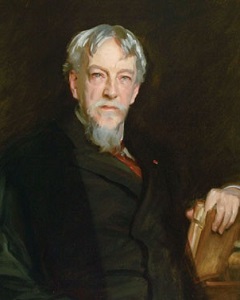De Amerikaanse dichter, schrijver en arts Silas Weir Mitchell werd geboren op 15 februari 1829 in Philadelphia, Pennsylvania, als zoon van de arts John Kearsley Mitchell. Hij studeerde aan de universiteit van Pennsylvania en behaalde de graad van MD aan het Jefferson Medical College in 1850. Tijdens de burgeroorlog had hij de leiding over patienten met nerveuze aandoeningen en kwalen in het Turners Lane Hospital in Philadelphia en aan het einde van de oorlog werd hij specialist in neurologie. Op dit gebied werd de naam van Weir Mitchell prominent geassocieerd met zijn introductie van de rustkuur bij zenuwaandoeningen, met name hysterie, die door de medische wereld werd overgenomen; de behandeling bestaat voornamelijk uit isolatie, bed houden, diëten en massage. Zijn medische publicaties omvatten o.a. “Injuries of Nerves and Their Consequences” (1872) en « Fat and Blood » (1877). De ziekte van Mitchell (erytromalgalgie) is naar hem vernoemd.Naast zijn medische werk en privépraktijk had Mitchell ook een carrière als auteur. Hij publiceerde tal van korte verhalen, 19 romans, een biografie van George Washington en 7 poëziebundels. Hij was een vriend en beschermheer van de kunstenaar Thomas Eakins. De kunstenaar John Singer Sargent schilderde twee portretten van Mitchell, een ervan bevindt zich in de verzameling van het College of Physicians of Philadelphia. Mitchell ontving voor zijn werk als arts en schrijver eredoctoraten van verschillende universiteiten in binnen- en buitenland. In 1887 was hij president van de Association of American Physicians en in 1908-09 president van de American Neurological Association.
Of Those Remembered
There is no moment when our dead lose power;
Unsignaled, unannounced they visit us.
Who calleth them I know not. Sorrowful,
They haunt reproachfully some venal hour
In days of joy, and when the world is near,
And for a moment scourge with memories
The money changers of the temple-soul.
In the dim space between two gulfs of sleep,
Or in the stillness of the lonely shore,
They rise for balm or torment, sweet or sad,
And most are mine where, in the kindly woods,
Beside the child like joy of summer streams,
The stately sweetness of the pine hath power
To call their kindred comforting anew.
Use well thy dead. They come to ask of thee
What thou hast done with all this buried love,
The seed of purer life? Or has it fallen unused
In stony ways and brought thy life no gain?
Wilt thou with gladness in another world
Say it has grown to forms of duty done
And ruled thee with a conscience not thine own?
Another world! How shall we find our dead?
What forceful law shall bring us face to face?
Another world! What yearnings there shall guide?
Will love souls twinned of love bring near again?
And that one common bond of duty held
This living and that dead, when life was theirs?
Or shall some stronger soul, in life revered,
Bring both to touch, with nature’s certainty,
As the pure crystal atoms of its kind
Draws into fellowship of loveliness?
Evening By The Sea
With noble waste of lazy hours
I loitered, till I saw the moon,
A rosy pearl, hang vast and strange
Above the long gray dune!
And hither, thither, as I went,
My ancient friend the sea beside,
Whatever tune my spirit sang
The dear old comrade tried.
Friendship
No wail of grief can equal answer win:
Love’s faltering echo may but ill express
The grief for grief, nor more than faintly mock
The primal cry of some too vast distress.
Or is it for fair company of joy
We ask an equal echo from the heart?
A certain loneliness is ever ours,
And friendship mourns her still imperfect art.

Silas Weir Mitchell (15 februari 1829 – 4 januari 1914)
Portret door John Singer Sargent, 1903 (uitsnede)
